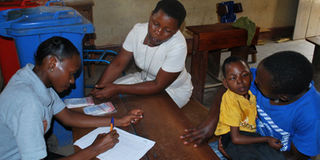The plight of single mothers raising children with disabilities

One of the parents receiving medical care for her child with disability at a community outreach organised by Joy for Children Uganda. PHOTO BY ROLAND NASASIRA
What you need to know:
- Hope came inform of support from Katalemwa Cheshire Home and later from Joy for children Uganda who offered physiotherapy to her son.
“I am my son’s legs and arms. But despite his situation, I cannot give up on him because I do not know what the future holds. He could become someone that will bring about family transformation and joy in the near future,” says Agnes Kabejja, as she describes her son, Ben Kato, who cannot walk nor hold anything on his own.
Another mother, Antoinette Nyangoma equally talks hopefully of his son who has autism, a condition he was born with.
“It was at the age of three that my son said his first word. When his father realised that our son was born with a disability, he ran away and abandoned us. I have since then been taking care of him by myself,” Nyangoma recalls.
When Jalia Nakintu gave birth to her son, those who were present asked her what kind of child she had given birth to. She looked at her son and just shed tears.
“It was just after two months that my son's head started swelling. I went back to the hospital but nothing was done to treat him. His head started swelling more. I was referred to a number of doctors who asked for huge amounts of money that I could not afford. Some people advised me to dump my son in the village. Others advised me to try local herbs. I went to the village for local herbs but they didn’t help. At that time, some people started laughing and stigmatising meand my son but I kept strong,” Nakintu recalls.
Hope
It was much later after she had hopped from hospital to hospital and consulted a number of experts that she eventually saw a ray of hope.
Hope came inform of support from Katalemwa Cheshire Home and later from Joy for children Uganda who offered physiotherapy to her son.
“My son received physiotherapy and after some time, his head stopped swelling. The support saw my son's situation change from near to death to big dreams. He is able to talk, goes to school and his dream is to become a lawyer much as I have to always check on him,” Nakintu says.
What is however disturbing is that none of Nakintu, Nyangoma, or Kabejja leave with the father of their children. They fled away and remarried and left them to raise their children single-handedly. They are single mothers.
For Nyangoma, she remembers her then husband openly telling her that the child they had been blessed with was not his son.
Lynda Nakaibale, the Project Officer, Children With Disabilities at Joy for Children Uganda says the limited accessibility to medical services by children with disabilities in slum areas where the organisation works is one of the many challenges that their parents go through. The expenses in form of drugs and treatment in hospitals are not only on a high end but parents and caretakers of such children live in poverty.
The outreaches
“It is at such points that as an organisation, we decide to hold community outreaches to address complex issues where parents can access free medical services to close the gap between hospitals and children with disabilities. They are carried out quarterly in different slums of Mulago, Bwaise, Bukoto and Makerere Kivulu where the project is implemented to restore hope in parents struggling to raise such children,” Ms Nakaibale explains.
The outreaches are aimed at contributing to Sustainable Development Goal three (SDG three) of good health and wellbeing and SDG four of gender equality and inclusion which aims at eliminating gender disparities in education and ensure equal access to all levels of education and vocational training for the vulnerable, including persons with disabilities, indigenous peoples and children in vulnerable situations by 2030.
They are also aimed at extending medical and psychosocial services closer to the Children with Disabilities and the care takers, create a platform for experience sharing amongst the care takers, raise awareness about issues concerning CWDs through sensitization and education and promote parent’s participation in medical and social rehabilitation of CWDs.
“During these outreaches, we also teach skills to parents and caretakers so that they learn how to make materials such as mats and table clothes from which they can earn a living to take care of their special need children,” Ms Nakaibale concludes.




